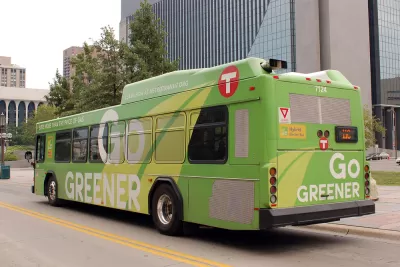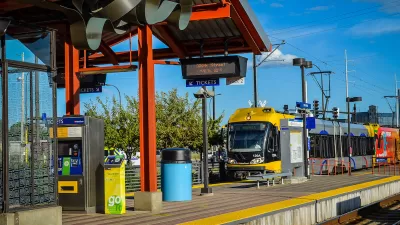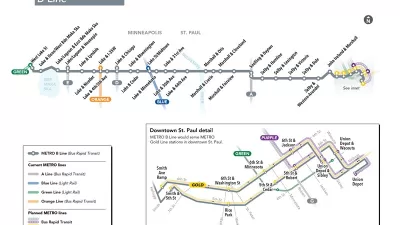The state's department of health is deploying the retrofitted buses to administer vaccines in hard-to-reach communities.

With a 40% reduction in service during the pandemic, Metro Transit, the Twin Cities' public transit agency, had some buses to spare. Meanwhile, some people in the state had difficulties accessing COVID-19 vaccines in their neighborhoods. "In Minnesota, as in many states, Black, Hispanic and Native American residents have received disproportionately fewer vaccine doses." To help get more people vaccinated, writes Henry Pan in Next City, "the Minnesota Department of Health, along with Metro Transit and Blue Cross and Blue Shield of Minnesota, debuted six buses specifically retrofitted to provide COVID-19 vaccines in areas where people need it the most."
The buses "are dispatched to a part of the state if the state health department finds an “obvious gap” in vaccine access. The health department works with partners in the community to identify these gaps, which can include a fear of crowds given social distancing guidelines, a lack of access to transportation and technology, free time, or poor English proficiency. Community organizations can also reach out to the health department to request a vaccine bus."
"Speaking to the challenges of getting people to vaccination events, Blue Cross and Blue Shield of Minnesota spokesperson Jenna Carter says, 'With each and every location, we learn there is no cookie-cutter solution, and each site is custom to the community, so we work hard every day to ensure we are customizing our approach and solution for each community.'"
FULL STORY: Minnesota Repurposes Transit Buses to Give COVID-19 Vaccines to Communities That Need Them Most

Manufactured Crisis: Losing the Nation’s Largest Source of Unsubsidized Affordable Housing
Manufactured housing communities have long been an affordable housing option for millions of people living in the U.S., but that affordability is disappearing rapidly. How did we get here?

Americans May Be Stuck — But Why?
Americans are moving a lot less than they once did, and that is a problem. While Yoni Applebaum, in his highly-publicized article Stuck, gets the reasons badly wrong, it's still important to ask: why are we moving so much less than before?

Research Shows More Roads = More Driving
A national study shows, once again, that increasing road supply induces additional vehicle travel, particularly over the long run.

Judge Halts Enforcement of Anti-Homeless Laws in Grants Pass
The Oregon city will be barred from enforcing two ordinances that prosecute unhoused residents until it increases capacity and accessibility at designated camping sites.

Advancing Sustainability in Los Angeles County Schools
The Los Angeles County Office of Education’s Green Schools Symposium brings together educators, students, and experts to advance sustainability in schools through innovative design, climate resilience strategies, and collaborative learning.

Using Old Oil and Gas Wells for Green Energy Storage
Penn State researchers have found that repurposing abandoned oil and gas wells for geothermal-assisted compressed-air energy storage can boost efficiency, reduce environmental risks, and support clean energy and job transitions.
Urban Design for Planners 1: Software Tools
This six-course series explores essential urban design concepts using open source software and equips planners with the tools they need to participate fully in the urban design process.
Planning for Universal Design
Learn the tools for implementing Universal Design in planning regulations.
City of Moreno Valley
Institute for Housing and Urban Development Studies (IHS)
City of Grandview
Harvard GSD Executive Education
NYU Wagner Graduate School of Public Service
City of Cambridge, Maryland
Newport County Development Council: Connect Greater Newport





























